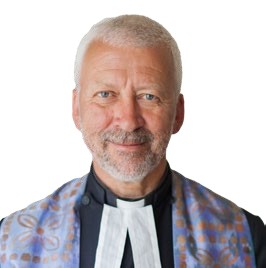MEDITATION
Faith is very real
The Rev Dr Richard Frazer explains why the pilgrimage of faith does not always run smoothly and can be full of questions.

The Rev Dr Richard Frazer
AS someone addicted to walking, just about my favourite Bible story is in Luke chapter 24, the encounter between Jesus and two of his disciples on the road to Emmaus.
Some of the deepest and most spiritual encounters I have had have been when I have walked with people and heard the stories of their lives and their faith. Where is church happening, I often wonder? Certainly in worship, but also out in the green, walking, talking and sharing the weight of existence.
Over the years, I have had many opportunities to walk with people. Not long ago, I had a conversation over a few days with a person who did not attend church, was diffident about organised religion and often expressed anger towards the church and towards God. She said that she was not a believer.
However, something about her story suggested to me that there was more going in her mind than merely antipathy towards faith. As we journeyed together in a group over several days, we had occasional conversations and I began to see in this person a very profound spirituality that, whilst it was not conventionally ‘religious’, ran very deep. In times of great difficulty, she articulated a ‘presence’ that had carried her through.
I spoke about this encounter with a respected theologian not long ago and he introduced me to a startling term.
He spoke of ‘Aggressive Atheism’. I am not convinced the term applied to this person. I was, however, gratified that this form of antipathy towards religion and God is understood as I have encountered it so frequently.
For many people faith is very real. However, it can be full of questions, frustration and even anger, at God or at the church. Traumatic events, rejection and negative judgement from the church, witnessing so much sorrow in the world, so many ‘slings and arrows of outrageous fortune’ can lead to a wilderness of confusion about God and faith. It is not atheism, it is, in many respects, the very opposite, a lively, serious, enquiring and dynamic faith rooted in addressing the realities of life.
As we journey with people and hear their stories (and it does not have to be on a long pilgrimage walk), giving people the chance to reflect on their experience can be healing. When we give people the time to share and are not too eager to try to convince, persuade or impart our version of faith, a lot of ‘Inner-Work’ can be accomplished that might overcome what has led people into a place of anger and confusion. So much of the past can be processed and worked through.
It has been one of the greatest privileges of ministry over the years to walk alongside people and listen before saying anything.
“Some of the deepest and most spiritual encounters I have had have been when I have walked with people and heard the stories of their lives and their faith.
The consequence has been a chance for people to settle their argument with God or with the church. When we really hear people, it can still them in the midst of their distress about life and faith.
Three days after the traumatic events of Good Friday, Cleopas and his friend (or was it his wife?) set off for Emmaus to clear their heads and begin to process the disaster that had happened to their friend, Jesus. Along the way, they encountered a stranger who spoke to them, listened to them and shared a meal with them. As the story goes, their hearts began to burn within them with renewed hope and faith.
The pilgrimage of faith is not always a smooth path; it can be a rocky road. There are many people out there waiting for someone to hear their story without judgement and share bread and conversation along the way.